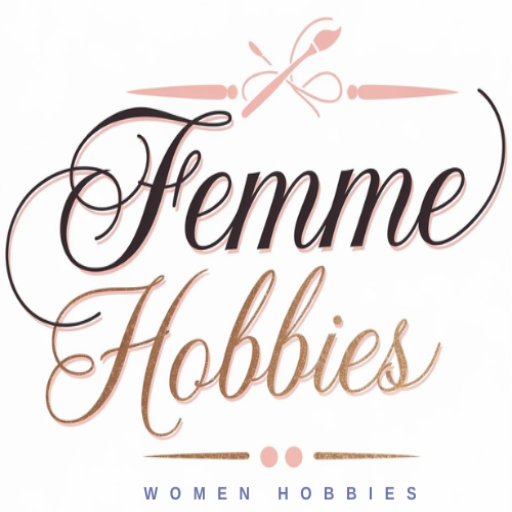Burnout does not announce itself with fanfare. It sneaks in quietly, through endless to-do lists, identity shifts, and the gradual erosion of joy. If you are a woman who feels emotionally drained, disconnected from yourself, or simply going through the motions, you’re far from alone. In my research, I have met many women like this, navigating life feeling stuck and unsure where to turn next. That’s why I created this list of empowering hobbies for women who feel stuck in life, to help you reconnect with yourself and rediscover joy one step at a time.
Research from the American Psychological Association shows that women experience significantly higher rates of burnout than men, particularly during major life changes. Whether it’s a career slump, motherhood identity shifts, divorce, or the empty nest phase, millions of women find themselves asking: Who am I beyond my responsibilities?
The answer often lies not in dramatic life overhauls, but in something surprisingly simple: hobbies. Lucy, a 35-year-old from Michigan, spent years caring for her aging parents while juggling a demanding job. She felt completely depleted until she joined a local hiking group. Those Saturday morning walks didn’t just strengthen my legs, she says. They reminded me I was still in there somewhere.
Scientific studies confirm what Lucy experienced firsthand. Engaging in meaningful hobbies boosts dopamine production, reduces cortisol levels, and helps rebuild neural pathways associated with pleasure and purpose. More importantly, they create space for the version of yourself that exists beyond your roles and obligations. That’s why exploring hobbies for women who feel stuck in life can be a powerful step toward emotional restart and self-rediscovery.
What Causes Women to Feel Stuck?
The feeling of being trapped is not typically the result of one dramatic event. Instead, it collects through a series of gradual shifts that slowly disconnect us from our authentic selves.
Career burnout tops the list of culprits. When work becomes a cycle of obligations without fulfillment, it drains our creative energy and sense of agency. Many women find themselves excelling professionally while feeling empty personally.
Identity shifts during motherhood create another common trigger. Lisa, a 40-year-old former marketing executive, describes the disorientation perfectly: I loved being a mom, but I missed having thoughts that weren’t about school schedules or snack preferences. Her therapist suggested photography walks, which became her weekly ritual of reconnecting with her creative self.
Major life transitions like divorce, empty nest syndrome, or health challenges can leave women feeling disconnected. The structures and relationships that once defined daily life suddenly shift, creating an identity vacuum.
Loss of routine or social connection compounds these feelings. When our days lack variety or meaningful interaction, we can feel invisible even in crowded rooms.
The good news? Feeling stuck is often a signal that you’re ready for growth, not evidence that you’re broken. Exploring new hobbies for women who feel stuck in life can be the first spark that reignites motivation and opens the door to change.
Why Hobbies Can Shift Your Mindset
Hobbies do more than fill time; they rewire your brain for possibility. Neuroscience research shows that learning new skills creates fresh neural pathways, literally changing how your brain processes joy and achievement.
Regular hobby engagement offers three key benefits:
A break from overthinking. When you are focused on a pottery wheel or identifying wildflowers, your mind steps away from the endless loop of worries and responsibilities. This mental reset reduces anxiety and creates space for new perspectives.
Permission to play, fail, and grow. Unlike work or family responsibilities, hobbies come with lower stakes. You can experiment, make mistakes, and try again without serious consequences. This rebuilds confidence in your ability to learn and adapt.
A bridge to purpose and identity. Hobbies help you remember what brings you alive. Jessica, a 44-year-old from Colorado, started making woodworking videos during the COVID lockdown. What began as a creative outlet turned into a thriving Etsy shop and a renewed sense of entrepreneurial identity.
15 Empowering Hobbies for Women Who Feel Stuck in Life
1. Foraging & Wildflower Identification
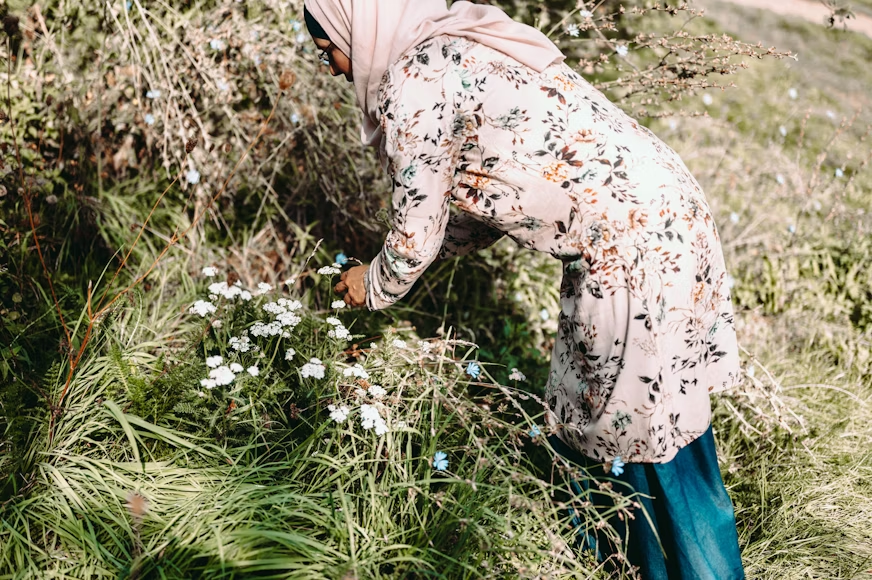
Purpose: Connects you with nature’s rhythms while building mindful awareness
How to start: Download the Seek app and spend 20 minutes weekly identifying plants in your neighborhood
Real example: Amanda, a 33-year-old from Oregon, began taking solo wildflower walks during her lunch break. It felt like therapy without the talking, she says. I started noticing seasons again instead of just surviving them.
Pro tip: Join local naturalist groups through your parks department for guided walks and community connection.

2. Memoir Journaling or Life Letter Writing
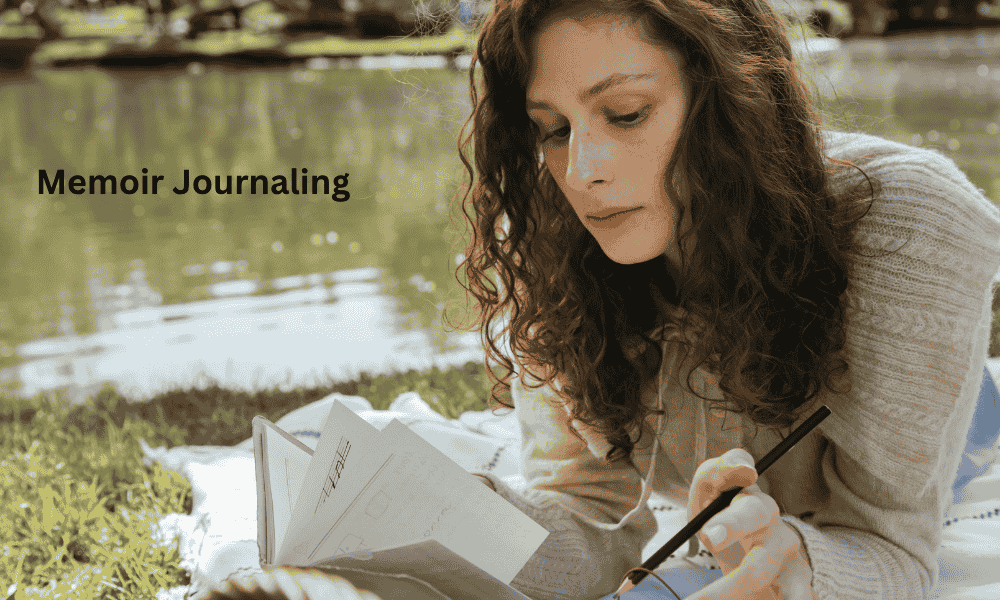
Purpose: Processes emotions and experiences through storytelling
How to start: Write one letter weekly, to your younger self, future self, or someone from your past
Real example: Emily, 45, used journaling to work through her divorce emotions. The practice evolved into a private blog where she shares wisdom about starting over in midlife.
Pro tip: Try writing with your non-dominant hand occasionally; it accesses different parts of your brain and can unlock surprising insights.
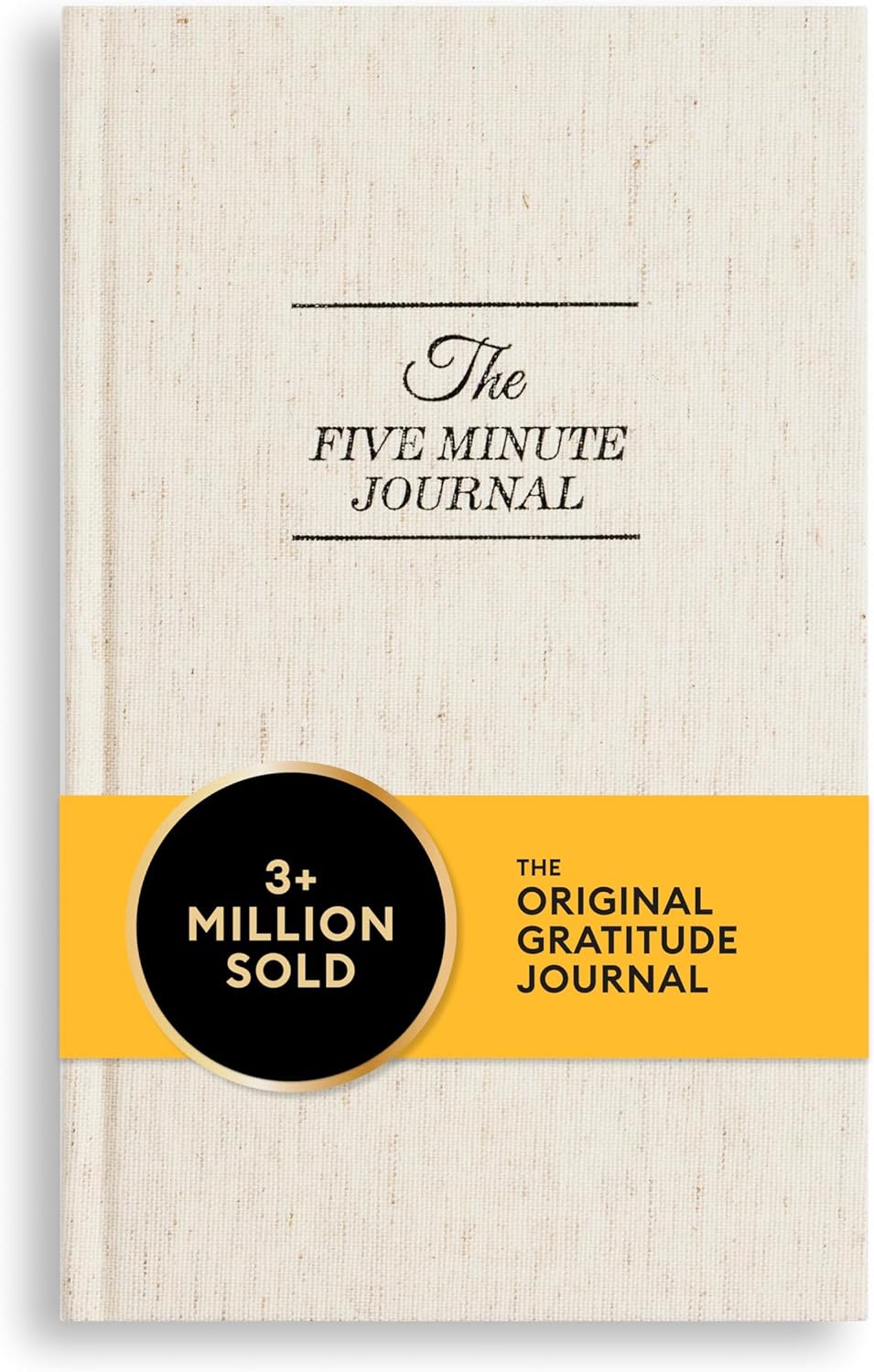
Sometimes, solitude offers the clearest answers. If you’re navigating life alone or simply need mindful “me time,” explore these solo hobbies for women who live alone — perfect for self-reflection, healing, and rediscovering your spark.
3. Furniture Flipping & DIY Restoration
Purpose: Creates visible progress and tangible transformation
How to start: Find one small item (picture frame, wooden stool) at a thrift store and watch YouTube tutorials
Real example: Sarah, 42, rescued a broken chair from a curb and spent $15 restoring it. The process was so satisfying that she now runs a profitable side business through Facebook Marketplace.
Pro tip: Start with pieces that only need cleaning and minor repairs before attempting major reconstruction projects.
4. Cold Water Plunging or Cold Showers
Purpose: Builds mental strength and triggers dopamine release
How to start: End your regular shower with 30 seconds of cold water, gradually increasing duration
Real example: Nicole, 31, began taking 60-second cold showers after therapy sessions. It was like hitting a reset button that worked better than coffee, she explains.
Pro tip: Focus on controlling your breath rather than fighting the sensation; this builds transferable stress management skills.
5. Community Mural Painting
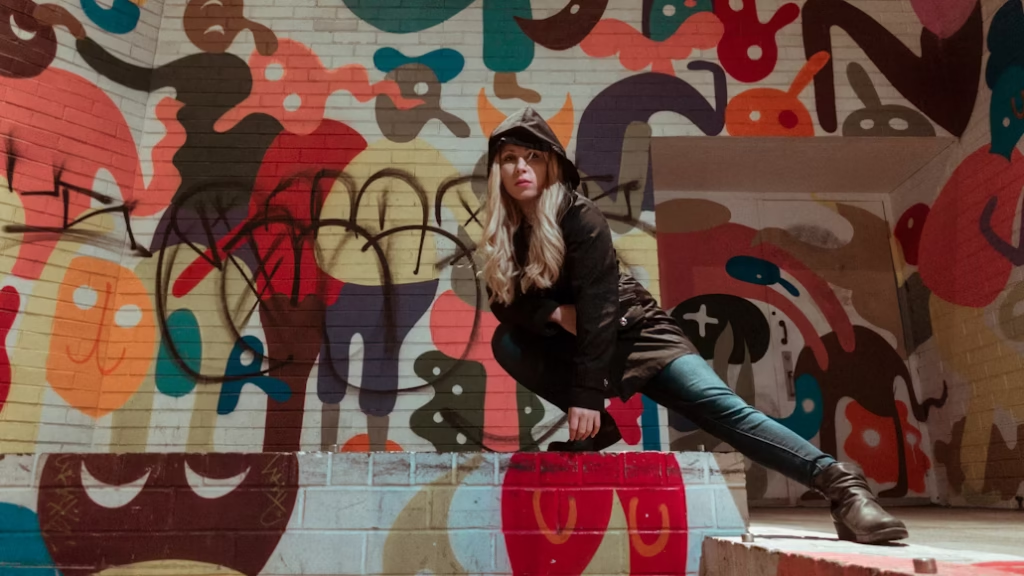
Purpose: Combines creativity with community service and connection
How to start: Search for local art organizations or check with community centers about volunteer opportunities
Real example: Rachel, 28, joined a neighborhood art group painting murals in local parks. After a difficult breakup left her feeling isolated, the weekly painting sessions helped her build new friendships.
Pro tip: Many cities have Paint the Town initiatives that welcome volunteers regardless of artistic experience.
6. Visible Mending or Textile Repair Art
Purpose: Transforms damage into beauty while practicing mindful, slow craft
How to start: Gather torn clothing and research Japanese sashiko or boro mending techniques online
Real example: Megan, 32, started mending her family’s jeans as a money-saving measure. The meditative process was so fulfilling that she now hosts Sunday repair circles in Seattle.
Pro tip: Use contrasting thread colors to make repairs into intentional design elements rather than trying to hide them.
7. Ecstatic Dance or Silent Disco
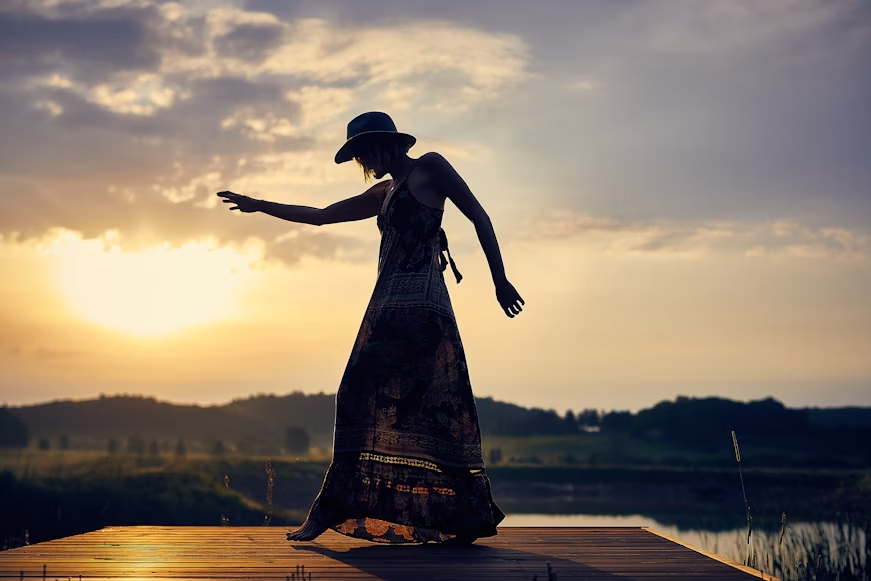
Purpose: Releases trapped emotions and reconnects you with physical joy
How to start: Look for 5Rhythms, ecstatic dance, or silent disco events in your area
Real example: Ana, 35, felt emotionally unstuck after attending her first silent dance session at a women’s retreat in California. I remembered my body could feel good, she shares.
Pro tip: Close your eyes during dancing to reduce self-consciousness and increase internal awareness.
If you’re feeling mentally overwhelmed or emotionally stuck, sometimes all you need is a little calm. Discover these relaxing hobbies for women that can help you slow down, breathe deeply, and restore your inner peace.
8. Fix-It Clinics & Repair Cafés
Purpose: Builds problem-solving confidence while contributing to sustainability
How to start: Search repair café near me or check library programming for fix-it events
Real example: Ashley, 52, volunteers at community repair cafés fixing small appliances. Learning to repair things gave me back confidence in my ability to solve problems, she says.
Pro tip: Bring items you are not emotionally attached to when starting, as it reduces pressure and increases learning opportunities.
9. Indoor Bouldering
Purpose: Builds physical strength, mental focus, and trust in your body
How to start: Visit a local climbing gym for a beginner class, most provide equipment and instruction
Real example: Heather, 28, joined weekly climbing meetups in Boston to manage anxiety. The physical problem-solving required complete present-moment focus.
Pro tip: Climbing is as much mental as physical. Celebrate solving problems, not just reaching the top.
10. Mobile Photography Walks

Purpose: Rediscovers beauty in everyday surroundings with minimal equipment
How to start: Commit to taking one interesting photo daily during existing walks or errands
Real example: Olivia, 42, began photographing one beautiful detail during her lunch walks. The practice helped her rediscover wonder in routine environments.
Pro tip: Focus on light, shadows, and textures rather than trying to capture perfect subjects.
11. Laughter Yoga or Clowning
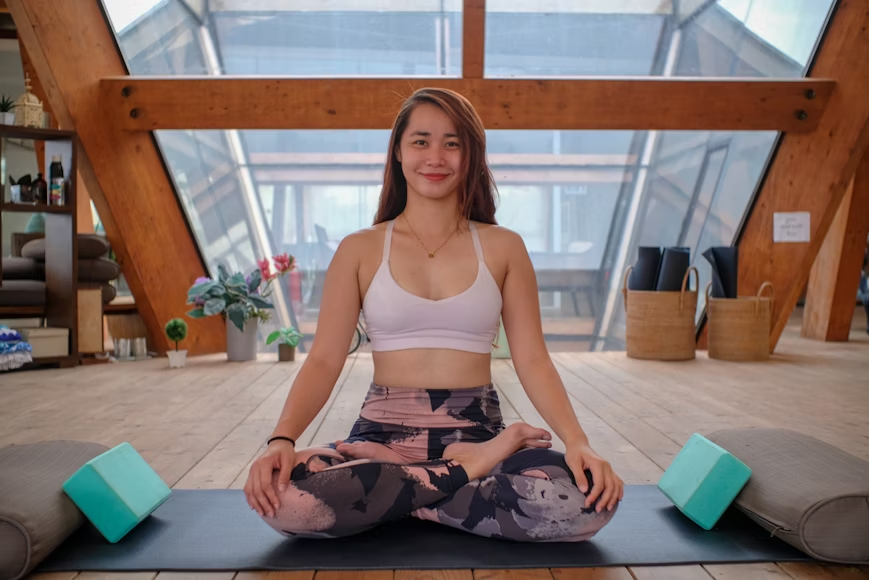
Purpose: Releases physical tension while reconnecting with playful joy
How to start: Search for laughter yoga classes or beginner clowning workshops at community centers
Real example: Jennifer, 48, took a clowning class after her therapist suggested she needed more joy. It helped me access parts of myself I thought were lost forever, she reflects.
Pro tip: The goal is not to be funny, it’s to practice being silly without judgment.
12. Kayaking or Paddleboarding
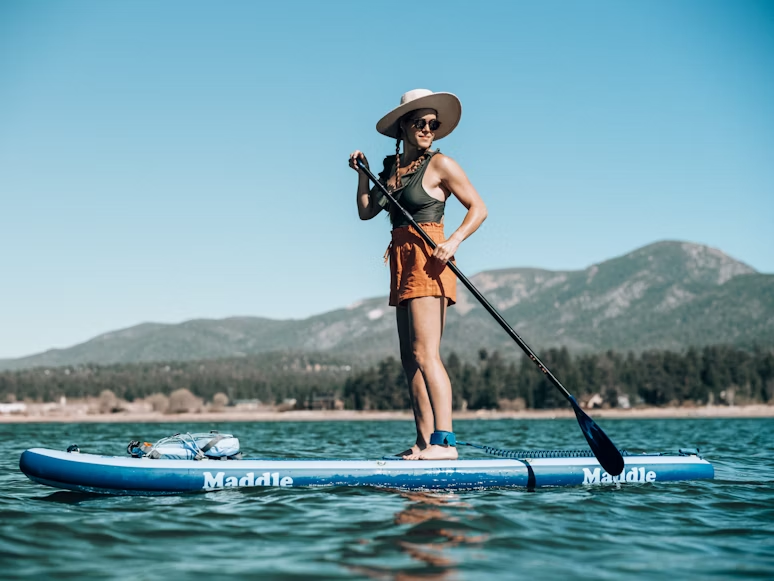
Purpose: Combines solo adventure with the healing properties of water
How to start: Rent equipment at local lakes or rivers before investing in gear
Real example: Michelle, 38, describes her Saturday morning paddle as her weekly reset ritual. The combination of physical effort and water meditation centers her for the entire week.
Pro tip: Start on calm, protected waters and always inform someone of your planned route and return time.
If you’re navigating your 30s and feeling mentally stuck or emotionally drained, this stage of life might need a fresh perspective. Explore these hobbies for women in their 30s that are designed to help you reconnect with yourself and feel inspired again.
13. Citizen Science Projects
Purpose: Contributes to meaningful research while connecting with a larger purpose
How to start: Visit SciStarter.org to find projects matching your interests and location
Real example: Mellisa, 35, tracks butterfly migration patterns in her area through Journey North. It makes me feel part of something bigger than my daily worries, she explains.
Pro tip: Choose projects that align with your existing interests, bird watching, gardening, and weather observation.
If you’re interested in contributing to real-world research, explore global opportunities through trusted platforms like National Geographic’s Citizen Science Projects and SciStarter.org.
14. Fire Spinning or Flow Arts
Purpose: Rebuilds body confidence while practicing moving meditation
How to start: Begin with silk poi or hula hoops before progressing to fire props
Real example: Kimberly, 30, took a hoop dancing workshop on a whim. For the first time in years, I felt powerful in my skin, she remembers.
Pro tip: Focus on the flow and rhythm rather than tricks; it’s meditation in motion.
15. Improv Classes
Purpose: Reconnects you with spontaneity, voice, and creative confidence
How to start: Look for beginner-friendly improv classes at community theaters or comedy clubs
Real example: Stephanie, 42, joined a local improv group to remember how to laugh again after a difficult year. The experience helped her rediscover her quick wit and social confidence.
Pro tip: The fundamental rule of improv, Yes, and…is excellent practice for embracing life’s unexpected moments.
Want a complete list of ideas? Explore our full guide on Hobbies for Women and find something truly inspiring.
How to Pick the Right Hobby Without Pressure
Choosing a new hobby when you’re already feeling overwhelmed can create additional stress. Instead of committing to the perfect choice, match activities to your current energy levels and circumstances. This flexible mindset is especially important when exploring hobbies for women who feel stuck in life, as the goal is to reconnect with joy, not add pressure.
Low energy days: Try visible repairing, journaling, or mobile photography, activities that can be done at your own pace
Medium energy days: Consider indoor climbing, photography walks, or repair cafés, moderate physical or social engagement
High energy days: Explore paddleboarding, community murals, or improv classes, activities requiring more physical or social energy
Start microscopic. Watch one YouTube tutorial. Attend one meetup. Take one cold shower. Commitment can grow from curiosity, but it rarely works in reverse.
The most important factor is not finding the right hobby—it’s permitting yourself to explore what feels interesting right now, without pressure to turn it into a lifelong passion or another obligation.
Pro Tips for Women Starting Over
Schedule hobby time like therapy. Block time in your calendar and protect it as fiercely as you would a doctor’s appointment. Consider establishing Hobby Thursdays or a weekend morning ritual.
Track your emotional state. Notice how you feel before and after hobby sessions. This data helps you understand which activities genuinely restore your energy versus those that drain it.
Find your people. Join local or virtual communities centered around your chosen hobby. Facebook groups, Meetup.com, and community centers frequently host gatherings that are beginner-friendly.
Start with what you have. Don’t let equipment purchases delay your start. Most hobbies can begin with basic supplies or borrowed gear.
You’re Not Lost—You are Paused
The feeling of being stuck often masquerades as failure, but it’s frequently a sign that you are ready for growth. Your dissatisfaction with the status quo indicates that part of you remembers what energy feels like and refuses to settle for less.
You don’t need to overhaul your entire existence or discover your life purpose through a single hobby. Sometimes, the most profound transformation begins with the simple act of doing something that brings you joy for no reason other than the joy itself. That’s why exploring hobbies for women who feel stuck in life can be such a powerful and healing step.
That hiking group Lisa joined in Michigan? It didn’t solve her caregiving challenges or change her job. But it reminded her that she was still in there, still curious, still capable of wonder, still deserving of experiences that fed her soul rather than depleted it. It’s often small steps, like engaging in hobbies for women who feel stuck in life, that begin to restore a sense of self.
Your next step doesn’t have to be perfect. It just has to be yours.
FAQs
Engaging in hobbies like painting, yoga, gardening, journaling, or learning a new language can help women regain confidence and a sense of identity.
Hobbies such as meditation, knitting, cooking, or spending time in nature are great for managing burnout and relieving stress.
Start by reflecting on activities you’ve always been curious about or enjoyed as a child. Consider your interests, lifestyle, and the time you can dedicate to exploring something new.
Yes, many studies show that engaging in enjoyable activities can reduce anxiety, improve mood, and boost overall well-being by providing a healthy outlet for stress.
Not at all! Hobbies are about exploring and enjoying the process. Starting something as a beginner is a great way to learn and grow without pressure.
